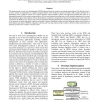301 search results - page 26 / 61 » Using Wikipedia for Automatic Word Sense Disambiguation |
ECAI
2000
Springer
14 years 7 days ago
2000
Springer
Abstract. This paper describes an experimental comparison between two standard supervised learning methods, namely Naive Bayes and Exemplar–basedclassification, on the Word Sens...
LREC
2010
13 years 9 months ago
2010
This paper presents a word sense disambiguation (WSD) approach based on syntactic and logical representations. The objective here is to run a number of experiments to compare stan...
TSD
2001
Springer
14 years 10 days ago
2001
Springer
Two kinds of systems have been defined during the long history of WSD: principled systems that define which knowledge types are useful for WSD, and robust systems that use the info...
TAL
2010
Springer
13 years 6 months ago
2010
Springer
Mihalcea [1] discusses self-training and co-training in the context of word sense disambiguation and shows that parameter optimization on individual words was important to obtain g...
AAAI
2011
12 years 8 months ago
2011
Effective access to knowledge within large declarative memory stores is one challenge in the development and understanding of long-living, generally intelligent agents. We focus o...

